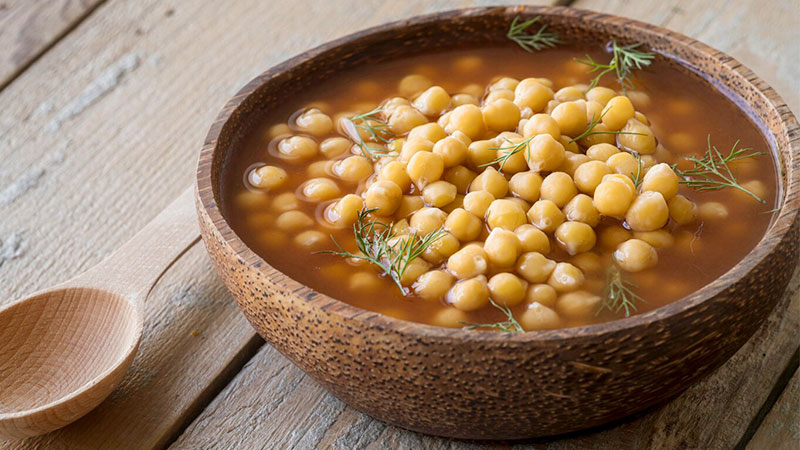
Chickpeas, also known as garbanzo beans, have been a staple in Middle Eastern diets for thousands of years, and it’s no wonder why.
These versatile legumes offer a nutty taste and grainy texture that blend seamlessly with a variety of dishes.
Beyond their culinary appeal, chickpeas are a powerhouse of nutrition, boasting an impressive profile rich in vitamins, minerals, and fiber.
Incorporating chickpeas into one’s diet can lead to several health benefits. Their high fiber content aids digestion and supports weight management, while their plant-based protein makes them an excellent meat substitute for vegetarians and vegans.
Also, chickpeas’ low glycemic index and healthy fats contribute to blood sugar control and heart health.
As they are naturally gluten-free and not a common allergen, chickpeas are accessible to many, making them a valuable addition to any diet seeking both nutrition and flavor.
1. Nutrient-Dense Powerhouse
Chickpeas are exceptionally nutrient-rich, as shown by the Naturally Nutrient Rich (NNR) score, offering a high nutrient-to-calorie ratio. They provide essential vitamins and minerals like folate and magnesium.
Packed with fiber and protein, they aid in maintaining a balanced diet. Their composition supports the intake requirements advised by the Dietary Guidelines for Americans.
By consuming chickpeas, individuals maximize nutrition per calorie, which is vital for weight management and overall health. Their versatility in culinary applications further enhances their appeal as a staple health food.
2. Helps Promote Lasting Fullness
Chickpeas aid in maintaining a sense of fullness due to their high fiber content. A 164-gram serving offers about 12.5 grams of fiber, keeping individuals satiated longer.
Protein also plays a crucial role, providing approximately 14.5 grams per the same amount. Consuming chickpeas in meals helps reduce overall calorie intake by curbing hunger.
The complex carbohydrates in chickpeas ensure a gradual energy release, promoting sustained satiety. For those focusing on weight management, integrating chickpeas into their diet can be especially beneficial.
3. High in Plant-Based Protein
Chickpeas offer a robust source of plant-based protein. One ounce contains about 3 grams, fulfilling 6% of the recommended daily intake.
Almost all essential amino acids except methionine are present, making chickpeas a superior protein option compared to other legumes.
Protein is crucial for muscle repair and hormone function. Combined with 2 grams of fiber per ounce, chickpeas provide lasting satiety and slow digestion.
This nutrient combination makes chickpeas an attractive protein source for vegetarians and vegans focused on muscle health and balanced nutrition.
4. Supports Healthy Weight Management
Chickpeas aid in weight control by enhancing satiety, thanks to their high fiber and protein content.
Serving sizes of 164 grams contain about 12.5 grams of fiber and 14.5 grams of protein, helping curb excessive calorie intake.
Fiber and protein ensure a steady energy release, reducing hunger pangs. Plant-based protein in chickpeas provides almost all essential amino acids, contributing to muscle health.
Their naturally nutrient-rich profile, which includes vitamins like folate and minerals such as magnesium, makes them a wise choice for dietary plans focusing on weight management.
5. Aids in Blood Sugar Stability
Chickpeas aid in blood sugar stability by promoting healthy glucose regulation. High in fiber and protein, they help manage blood sugar levels effectively.
A 2014 study showed a 4.7% reduction in blood sugar after a meal with chickpeas compared to white bread. People with type 2 diabetes see improvements due to these properties.
A 2023 review of 28 studies confirmed that consuming chickpeas positively affects markers like hemoglobin A1C and insulin resistance. Nutrients in chickpeas, such as proteins and peptides, play critical roles in blood glucose regulation.
6. Benefits Digestive Health
Chickpeas improve digestive health by offering a significant fiber boost. Fiber supports bowel regularity and prevents constipation.
Consuming chickpeas aids in maintaining a healthy gut environment by promoting the growth of beneficial bacteria.
This legume also reduces the risk of digestive disorders such as diverticulitis. High in fiber, a 164-gram serving provides about 12.5 grams, which is essential for digestion.
The chickpea’s nutrient profile supports digestive efficiency and overall gut wellness by combining fiber and minerals like magnesium.
7. Offers Protection Against Some Chronic Diseases
Chickpeas boost health by offering protection against chronic diseases. Rich in antioxidants, they combat harmful free radicals, reducing cellular damage.
Studies highlight that chickpeas’ fiber content lowers heart disease risk by managing cholesterol levels. They also contain magnesium, supporting cardiovascular health.
High fiber supports insulin regulation and reduces type 2 diabetes risk. Also, chickpeas provide phytochemicals like saponins, with properties that may inhibit cancer cell growth.
Eating chickpeas contributes to long-term disease prevention, making them a valuable part of a balanced diet.
8. Supports Brain Function and Health
Chickpeas boost cognitive abilities. They’re rich in choline, essential for neurotransmitter synthesis, supporting memory and learning.
High magnesium levels in chickpeas improve nerve function and signal transmission. Folate content aids in producing brain chemicals, enhancing mood and mental clarity.
Amino acids found in chickpeas boost serotonin production, contributing to emotional well-being.
Vitamins like B6 synergize with proteins to regulate hormones impacting brain health. Incorporating chickpeas into meals offers nutrients vital for maintaining brain health and function.
9. May Reduce Risk of Iron Deficiency
Chickpeas help combat iron deficiency by providing 4.7 mg of iron per cup, meeting up to 26% of daily needs. Iron from plant sources like chickpeas gains better absorption when combined with vitamin C, which they also contain.
Incorporating chickpeas in a diet helps maintain adequate iron levels and prevent anemia, commonly characterized by fatigue and weakness.
Vegetarians and vegans can achieve necessary iron intake through regular chickpea consumption. Beyond iron, chickpeas contribute magnesium, enhancing overall health. They’re a strategic choice for those mindful of iron deficiency.
